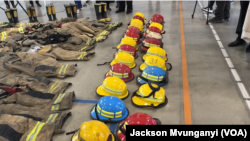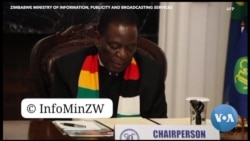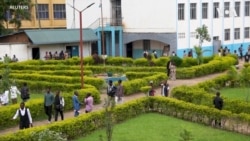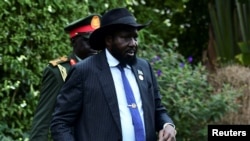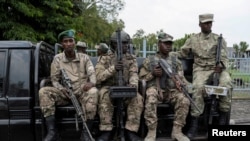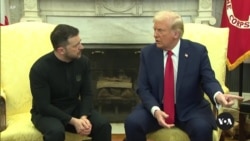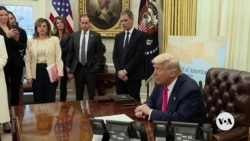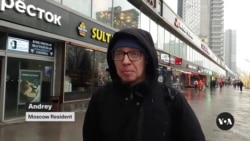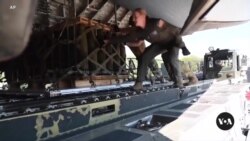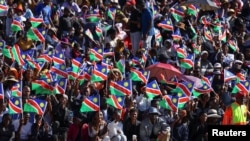Conflict
Burundi Troops Split DRC Opinions
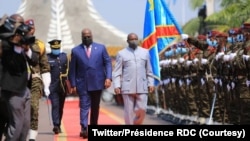
The deployment of Burundian troops to help quell rebel groups in the Democratic Republic of Congo's east has divided local people, with some fiercely opposed but others giving a cautious welcome.
Some people are skeptical that the Burundian deployment will improve security, but others hope for an improvement.
Others are enraged that Burundi -- accused like Rwanda of past meddling in the mineral-rich region -- has been invited into the DRC.
The deployment is "one more humiliation for our nation," said 2018 Nobel Peace co-laureate Denis Mukwege, a surgeon who has treated thousands of rape victims in the region.
"Let's end the policy of outsourcing our security to destabilizing states & work on reforming our army to make it professional and operational," he said on Twitter on Tuesday.
Burundian forces began arriving in South Kivu province on Monday, pushing ahead with a plan by the seven-nation East African Community (EAC) to stabilize the chronically troubled region.
Thousands of people have died at the hands of rebels in the country's east over the past decade, and tens of thousands have fled their homes.
The DRC's armed forces, supported by a large UN peacekeeping mission, have been unable to stem the bloodshed.
Attacks have continued, even though the provinces of North Kivu and Ituri were placed under emergency measures in May last year to help the fight against the rebels.
Under this so-called "state of siege," senior civilian officials have been replaced by members of the security forces.
A campaign group in South Kivu, the New Dynamics of Civil Society, said foreign forces "only intensify rather than resolve the problem."
"The majority" of these forces have been on the DRC's territory for years, it charged, alluding to long-standing suspicions of interference by the country's neighbors.
Some nations support armed groups to "maintain chaos... (and) loot our mineral resources," it said.
Saint-Cadet Kibibi, head of civil society group Minembwe, said the Burundian troops were "welcome," although he questioned whether the forces would be able to bring peace.
"We want to see this force do its job correctly, with respect for international humanitarian law," he said.
An estimated 120 armed groups, many of them organized along ethnic lines, operate in the region.
Among the bloodiest are the Allied Democratic Forces (ADF), which the self-described Islamic State claims as its regional affiliate, and a Congolese Tutsi militia called the M23.
Some groups are historic opponents of regimes in neighboring countries and have holed up in the DRC -- which could complicate the EAC mission.
In Burundi's case, this includes the Burundian rebel groups RED Tabara and the FNL, or National Liberation Forces.
Kelvin Bwija, of a group called the Civil Society of Compatriots/Uvira-Fizi, said he hoped the operations would be given a "precise timeline" for winding up.
The EAC comprises Burundi, the DRC, Kenya, Rwanda, South Sudan, Tanzania and Uganda.
In June, the bloc's leaders decided to set up a regional force that would work alongside Congolese troops.
Kenyan and Ugandan forces will be deployed to North Kivu and Ituri, while South Sudanese forces will be sent to Haut-Uele province.
Kinshasa accuses Kigali of supporting the M23 rebel group in North Kivu and has rejected any participation of Rwandan troops in the EAC force.
See all News Updates of the Day
Africa News Tonight: Hunger, violence stalk Goma residents, US considers AFRICOM changes, Cyclone batters southern Africa
Africa News Tonight: Angola advances DRC talks, Tunisian opposition leaders remain jailed, US firefighters team up with Liberian colleagues
Southern Africa bloc to begin phased withdrawal of troops from DRC
The Southern African Development Community or SADC said Thursday that a summit of regional heads of state had terminated the mandate of its troop deployment in the eastern part of the Democratic Republic of Congo and decided on a "phased withdrawal." SADC lost more than a dozen soldiers in conflict in January. The 16-nation bloc took the decision at a virtual summit on the conflict in the area that has seen some three decades of unrest and claimed millions of lives. "Summit terminated the Mandate of SAMIDRC and directed the commencement of a phased withdrawal of SAMIDRC troops from the DRC," the Southern African bloc said in a communique after the summit. The SADC Mission in the Democratic Republic of Congo, SAMIDRC, — made up of soldiers from Malawi, Tanzania and South Africa — was sent to the region in December 2023 to help the government of the DRC, also a SADC member, restore peace and security. SADC extended its mandate late last year.
Africa News Tonight: DRC, US in talks on trade and security, concerns of civil war risk in South Sudan, tariff talk rattles stock markets
University students resume studies in Bukavu as DRC crisis deepens
University students in Bukavu, in the east of the Democratic Republic of Congo, are gradually returning to class for the first time since M23 rebels took their city last month. Toto Mufungizi, a student, said while they were home “during these months, we have endured many strange things.” “We stayed at home for at least one month and three weeks. We were confined due to this security situation. Even today, there is no serenity, we cannot move around safely," he told Reuters. The M23 rebel group captured Bukavu, South Kivu's capital, in mid-February, forcing a weeks-long suspension of academic activities. The Official University of Bukavu, UOB, and other institutions have now reopened, but security concerns persist. "We are afraid because we heard rumors that in Goma, students were kidnapped. Here, we are also afraid," third-year student Patient Kaliwe said. Some information for this report was provided by Reuters.
Africa News Tonight: Expert calls for dialogue in DRC conflict, Uganda sends troops to Juba, top US, Ukrainian diplomats talk in Jeddah
Africa News Tonight: Exploring the roots of DRC's conflict, Sudan’s displaced face hunger, Morocco's traditions shape Ramadan observances
US-Ukraine to hold talks in Saudi Arabia on how to end war with Russia
Even as U.S.-led peace negotiations to end Russia’s war in Ukraine recently faced setbacks, talks between Washington and Kyiv are set to take place this week in Saudi Arabia. VOA’s Veronica Balderas Iglesias has the details.
US hostage envoy calls Hamas meeting ‘helpful’
A Trump administration hostage negotiator called his recent meetings with representatives of U.S.-designated terror group Hamas “helpful.” Discussions focused on the release of an American-Israeli hostage held by Hamas. This, as Israel says it plans to deploy a delegation this week to discuss ceasefire talks. VOA’s Arash Arabasadi has the story.
Africa News Tonight: Arab nations plan Gaza’s future, Afrikaner groups accused of treason, Sudan health workers struggle to provide care
Russia waits for Trump's next move after clash with Zelenskyy
Russians are carefully watching U.S. President Donald Trump's push for an end to the war in Ukraine after his heated encounter last week with Ukrainian leader Volodymyr Zelenskyy. Elizabeth Cherneff narrates this report from Moscow.
European leaders question the halt in US military aid to Ukraine
U.S. President Donald Trump ordered a "pause" Monday to military aid shipments to Ukraine with immediate effect, which his administration said was aimed at forcing all sides to peace talks. As Henry Ridgwell reports from London, European leaders have said it is vital to continue weapons shipments to Kyiv — but there are doubts over how long Ukraine can keep on fighting.






